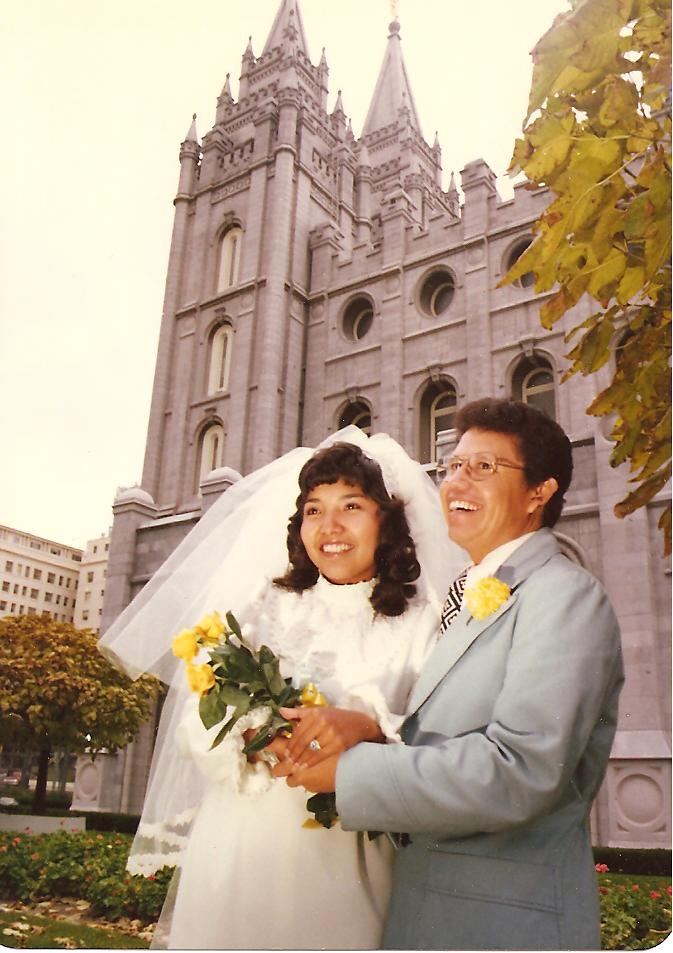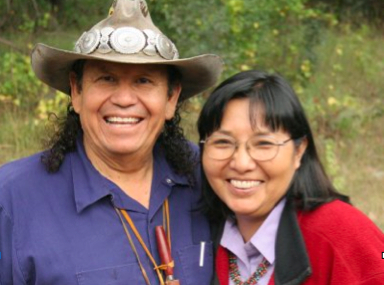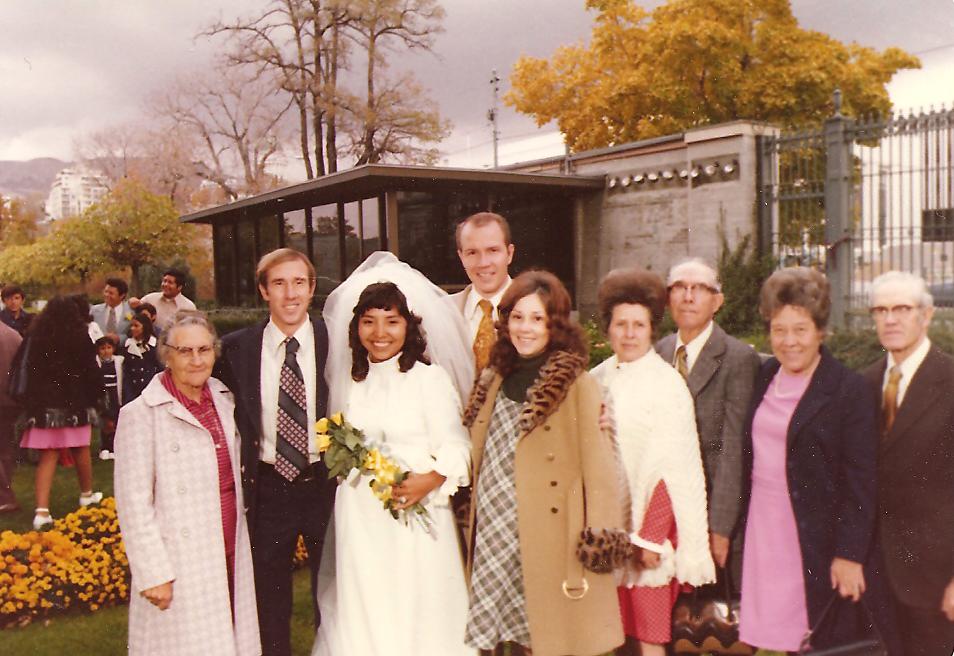Mesa, AZ, August 2010
Pauline Sanchez was born in her grandmother’s hogan on the Navajo Reservation in Arizona. From the age of eight until graduation from high school, Pauline spent her school years living with a white family in northern Utah as part of the church’s Indian Placement Program. Pauline describes feeling lost within different worlds and how her native language helped her understand the value of her experiences. She is on the Advisory board at The Anasazi Foundation, a wilderness treatment program for troubled teens and their families. She, with her husband Ezekiel, were honored as the 2001 Arizona Parents of the Year, and in 2002 received the National Excellence in Parenting Award.
From 1961 to 1972, you participated in the church’s Indian Placement Program, which placed Native American children in LDS families for the school year. What was that like for you and your family?
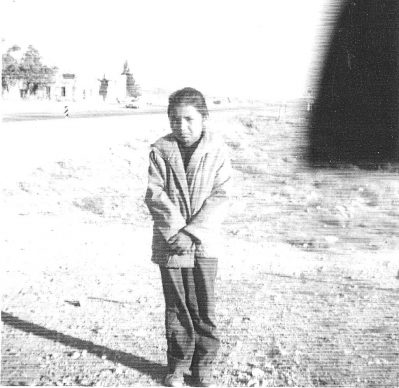
I struggled with being part of three different worlds all at the same time: my Indian world, my Mormon world, and then my American world. As I grew, I realized there are so many variables, so many points of view, and so many ways of doing things in life. In my native life, for instance, I was expected to go through certain rites of passage and maintain a certain way of living spiritually which was different from what I learned while I lived with my foster family in Utah. I thought, “How do I stay tied to my heritage, to my people? How do I live my new found faith along side what is expected of me on the reservation? ” It is Navajo tradition to bury a daughter’s umbilical cord stub in the hogan in hopes that she will make a good home. The burying of the umbilical cord also symbolizes the child belonging to the family. I wanted to maintain that tie. But some of the things in my native culture I couldn’t bring into my membership in the church. I had to ask myself how to resolve that dilemma.
My native family faced all kinds of different challenges as a people. Living in nature without a lot of modern facilities was surviving day to day. But there were wonderful things they gleaned out of that life, like the value of life itself, the value of being tied to kinship. That kinship is sacred. That there is a Creator. That kinship is valuable, and our life is valuable.
My father did not know any English. I maintained my tie to my culture because of the necessity of the Navajo language in our home and interpreting for my dad and the older people. The generation of my grandparents’ spoke Navajo on the reservation, so that’s what we spoke.
Would you describe how you became involved in the Indian Placement Program? How did your family make the decision to send you away to school?
There are many of us who left the reservation because of necessity, the need to be educated better.Because my father was never allowed to go to school, he saw this as an opportunity for me not only to gain education, but for other opportunities as well. In their love for me, and I believe guided and directed by the Spirit, my parents sent me off so that my life might not be limited. It was brave of my parents, who often needed me to interpret for them when they talked with doctors and others who spoke only English.
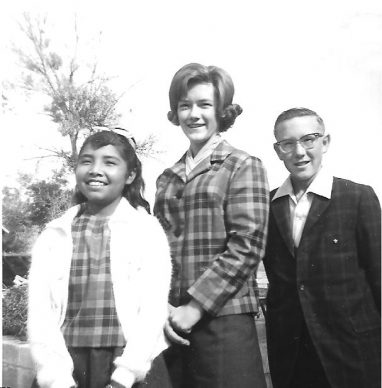
Pauline with her foster sister and brother
We lived way out there. The closest school on the reservation was in Tuba City. In order to go to school, we had to get up really early and catch a bus so we could make the 45 mile trip with stops to pick up all the children on the way to Tuba City. And even before that, there was building a fire, getting us dressed, and getting all the food cooked without running water and electricity and then get to the trading post. If you missed the bus there was no transportation because we didn’t have a car.
So when the case workers came and explained the Indian Placement Program, my parents signed me up because they trusted these people, the ones that came speaking for the church. The United States government required that participants in the Indian Placement Program had to be members of the church. The program took kids off the reservation; it was all done in a legal way so the children taken were accounted for. The tribe could also ensure that the children were well cared for. It was an act of faith on the parent’s part. As time went by my eight siblings joined me in the program, one by one, with varying results.
And so I was baptized that summer when I was eight. I don’t know if I was taught the gospel, but I do remember vaguely being in some kind of class. I was so young. I remember being taken to Tuba City on the reservation and being dressed up in white. I remember singing a hymn and being baptized, being brought back home and running wild again until it was time for them to put me on the bus to Utah.
As the bus moved north toward Provo, Utah, passing my birth place and familiar surroundings, my heart would get that hollow feeling as tears rolled down my cheeks. I was heading to the land of abundance while my family on the Reservation was moving into the winter months, without electricity or running water. Life was difficult in the small one-room square home built by my father, with two windows, one full size bed, one twin bed, one crib, boxes of clothes, and a wood burning stove.
During the school year, when I went back to Utah to go to school, I could not live up there like I did on the reservation. In Utah, I turned on the lights, I had electricity. I opened the refrigerator, it was full of food. I turned knobs and switched on things, and traveled at a faster speed than on a horse. The schedule in my Utah life was the greatest challenge. On the reservation, life was based on certain works that I did. I had to build a fire. I had to nourish myself. There are things that need to be done, but at their natural pace. When I would go back to the reservation, I put the clock away. I lived as the sand moves, and the sky. It was so much simpler! I could enjoy being with my family and enjoy the learning that took place. They supported me and encouraged me to do my best. Every year I would leave my natural parents wearing new clothes, bought by their meager income. As I grew into my teen years, it became harder to leave them. This time, instead of them buying me new clothing, I would leave whatever was left of my meager summer job income with them.
What were the most difficult challenges for you culturally, going back and forth from your reservation home to your Utah home?
Outward appearance was more important in Utah than it was on the reservation. On Sundays I had to wear a dress. I had to wear nylons and my hair had to be just-so. When I was a child in Primary, there were classes and tasks we had to complete and banners with check boxes to fill in. That is how children earned honor. This was very different for me. I really enjoyed those years, but as a child I had to absorb two very different cultures.
Back in Navajo life, in the hogan, there are no windows. The door faces east and there is only a smoke hole. When I went on placement and into my foster home there were three doors, one that faced north, one that faced south, and one that faced west. They had all these windows and they divided the house into all these different rooms. The hogan was just one big room where you did everything. You cooked there, you slept there. It was the classroom, it was the kitchen, it was the living room.
We all come differently. We’re all living life tailored for our own experience. It doesn’t matter who we are, we have been all blessed with a power to become better than we thought we could become. In doing that, we have to accept that we are going to be different, that people have different languages and different ways of looking at life. We experience different things. Some of us experience two parents in a home. Others experience one parent. Others are orphans. Some are like me: because of my Utah foster home, I have two sets of parents and I have six sets of grandparents that I claim as my own. If someone sees life from a different point of view and they share it with us we think, “Wow! I didn’t realize there was that way of living.” Most of the time we are filled with gratitude and we honor what somebody else has gone through, but we generalize too much about each other. A lot of times we look at each other just visually. I look at somebody who is Caucasian and think they are different from me. “They don’t understand where I’m coming from. Their life has been easier than mine because they’ve had the advantages of science. They could afford things that I couldn’t afford when I was younger.” I judge them on their possessions or on their opportunities compared to the lack of opportunities in my life and the catching up I’ve had to do to stand equal with them.
It is important for all of us to honor our pasts so we can be blessed with gratitude and appreciation for who we are and what we are. Where much is given much is required. Life has been given us to grow. In that growing we can’t grow alone. Alone it would be like surviving in the wilderness. We can’t survive alone. We need to be tied to others in a way that we can develop trust, in a way that helps us grow well together.
I struggled at first to adjust with the strangeness of this new world I was entering. Looking back, I am amazed at the trust I had put in the decision made for me, by my father and mother. I cried when my foster parents were introduced to me as “my new parents.” In that moment I realized how far away from home I was, and that there was no going back. I came to love and trust them and their children. I inherited more grandparents, more uncles, more aunts, and more cousins. As I grew among them I was not just “the placement student,” but I became “our Indian daughter Pauline,” “our Indian sister Pauline,” “our Indian granddaughter Pauline,” and “Aunt Pauline.” This family and the extended families have been the most wonderful examples of kindness and generosity. They created a belonging place for me in their family and in the community. They opened up the world to me in a safe way by their love. They encouraged me to be better than I thought I could be.
The Placement Program became a saving opportunity for me. The greatest gift my natural parents gave me was allowing me to live my newfound faith and accept that I might not come home to stay for a long time. This gift of allowing me to own my own life has given me the freedom to choose the best of the different cultures that I lived in. My experiences off the reservation brought me back to enjoy the rich goodness of my heritage as a Native American woman, and equally live my divine nature as a member of the Church of Jesus Christ of Latter-day Saints.
The Indian Placement Program began in 1947 and ended 1996. Do they have better schools on the reservation for the children now?
I have visited some of the schools. I visited one where I am from. After fifty-four years they finally built a school near the place of my birth for seventy-four children. The Navajo Nation is trying to improve the educational systems on the reservation. It takes funding, good educational leadership, dedicated teachers, and supportive parents. In some areas of the reservation conditions are similar to third-world countries, but children are learning and graduating. It is good to see them succeeding. I admire the parents who do all they can to support their children’s education. They are trying. It’s difficult and the children struggle a lot with it too, sitting in a classroom all day and being forced to read out of books. I think like me a lot of them are visual learners so they need to get up. They need to touch, to make, create, to understand what the words in the book mean.
As a mother to your own seven children, how have you incorporated your culture as you’ve tried to teach them the gospel? Have you been able to mesh the two?
It’s not so much the traditions of my people, but the language itself that has enhanced the gospel principals in our lives in a way that our children and the children of The Anasazi Foundation have responded to them. The children are so used to the English labeling of things. Some words have come to have a negative connotation. For instance, religion is a bad word. Being a virgin is a bad thing. Good things aren’t ‘good’—they are ’bad’ or ‘wicked’.
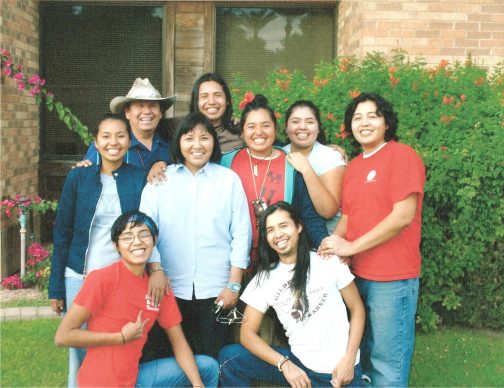
The role of parents has been tainted. They are no longer people that these children honor; they’re caretakers, “Oh that’s just my parent, my old man, old woman. They don’t care.” They’re not tied to their children as they used to be because the language has begun to change. The words have lost that special meaning they used to have. The Navajo language is different, it does not change.
In Navajo, ‘wicked’ doesn’t mean good; it means wicked. In Navajo, when you address your parents you say shi’ma’, which means ‘my mother’, or shi’azhe’e, ‘my dad’. Already they are yours, and there is a connection to them. The language has a kinship foundation. You come from a family group. You’re born to a family group, through your mother. You’re born for the family group your father belongs to. Families are very important, and you must memorize the family group name of your mother, and the family group name of your father, and those of your grandfathers’. I am tied to four different families called clans. I have a responsibility, I have a stewardship to act my part. No matter where I go I am always part of a family.
Navajo is a spiritual language, and because of that I can teach my children in ways that make them feel it in their hearts and paints a picture for them in their minds. They learn and feel it so it lasts and lingers in a way that makes it valuable to them.
For example, in Navajo we use the walking language. The question with which you greet someone is “Do you walk well?” It’s a positive thing. It’s a goal, it’s a searching question. “Do you walk well?’” It is the same in the scriptures: walking with God, walking upright, walking forward. There is a visual association with that. How do you walk with God? It causes you to stop and create a picture in your mind about how you personally would walk with God. It takes you a step forward. You’re obligated to have this uplifting experience. You have to look up and say, “How do I walk with deity? How do I walk with this pure perfected being? Is it possible for me?” You begin to search for how you would dress. How is he dressed? Not in clothing, but what are his attributes? The inside, the inward characteristics of who this person is, is valuable. You have to take that journey into what kind of experience that would be like, or how you picture it. It takes pondering and making choices. It’s like painting with words.
Members of my tribe often call each other shi’a’we’e’, which means “That’s my little one”. They honor that we belong to them. I love going home to my people. They take our temperature, or feed us, or ask about us. They sit down and start telling stories about when we were little, bringing back wonderful memories of us or our families and those wonderful memories that we can’t remember or that we have forgotten. They again recreate it the way they saw it. They paint it beautifully so that it is good, not only for us, but because these are the sacred things they continue to carry with them. I think, “Wow! I didn’t realize I was that important to them, that I am still that important to them! They really do know me, they really do care about me. I’m really tied to them. I really do belong to them.”
I would come back home to the reservation and my family would hug me and hold me and tell me stories and cook for me. They would invite me to serve them by chopping the wood, cooking with them, butchering the sheep with them, weaving the rugs with them, walking with them, riding horses with them. Whatever it is they just bring me in, taking me in with them.
I come home as a married woman and they want to hear about what life is like now. Are you walking well as a married woman? Are you happy? Is he making you happy? When I come now with children, they not only enjoy being with me, but also look at these beautiful beings that have come. They, and my children, are all joined together. I put the babies in their hands. They delight in us coming home to them and having these little ones.
How does your language help you understand and teach the gospel?
My language has been very valuable in teaching about spirituality. The name of deity is still holy and sacred. He is still a holy and a sacred being. I always try to convey who he is to my children so they feel his sacredness. That comes from my language, speaking words in a way that it lingers, speaking in a way that it is pressed into them and painted like beautiful murals on the walls of their hearts. I am trying to paint beautiful pictures about love, about compassion, about how much they are loved. I’ve tried to find a word for sacred and holy because in the English language these beautiful word have lost that feeling. How can I help others understand what that word means from the experience I’ve had with it? I finally came to a definition that I hope conveys the feeling of the words “sacred and holy”. If we are sacred, we are of immeasurable worth, beyond price, beyond anything earthly. Our value expands. There is no beginning and no end to our worth. Painting that picture of who we are I hope conveys that we are sacred beings. We are of immeasurable worth. Our power to create is unlimited, our ability to grow is unlimited.
In my native language, things are said in a way that gives more meaning to the things that really matter. It is a spiritual language. As I began to look back as an adult, I loved it and thought, “Why does it sound so pleasing to me?” When I look at the gospel of Jesus Christ, I realize it’s another way of looking, another point of view, another way of describing and putting into pictures what I was experiencing, creating a picture so when it was done I understood it better. It was beautiful. It was nourishing. It was pleasing.
You are the mother of seven children and now a grandmother. How do you describe your experience as your family grows and expands at this stage of life, and what do you tell your children and grandchildren about their rich heritage?
I tell Ezekiel, my husband, that through having little grandbabies we have been given added years. We are living our lives with our seven children, and then now we’ve got more years that have been given us to live with our granddaughter Grace, and more years to live with her sister Serenity, and more years to all these others that will come. It multiplies our years. Not physical years, but it gives us years of experience living with somebody else, knowing another person. The word that comes to me in describing living lives with others is ‘kinship’. I picture living with them horizontally, walking back and forth through them, finding and sharing good things of the soul and heart in pure moments, sharing spirit to spirit, and being blessed with and enjoying some of the heavenly dividends in each of those kinship. I keep telling my children we are really blessed because we are living so many lives.
We’ve just begun, earth life is just the Primary. We know in the pre-mortal life we were there with our Heavenly Father and our Heavenly Mother. We were there in this wonderful place where we learned with each other, but in a very sterile situation. We are let free here on the earth. We are a little more expanded, experienced. We won’t experience everything because we aren’t capable of experiencing everything yet. But there’s going to be enough joy and enough sadness, enough light and darkness in our lives, enough storms and enough suffering to enjoy the blessed peace and love and happiness so that we can move forward to another experience.
The Anasazi Foundation, a wilderness treatment program in Arizona for troubled teens and their families, has had hundreds of children come through the program over the last twenty years. You are on the board of directors, and your husband Ezekiel is one of the co-founders and widely recognized as a pioneer in the wilderness treatment industry. What have you both learned as you’ve watched the program over the years?
The word ‘Anasazi’ means ‘those who walked before,’ full of wisdom. I know that it was an inspired program. There’s not another word for it. I’ve been an observer and a participant. I’ve walked with some that came these twenty years; the children themselves and some of the parents, our wonderful staff and those supporters who have been a great blessing to us over the years.
It’s a family experience. Some of the children come with more than one set of parents, sometimes two sets of parents, sometimes three sets of parents. I think about the statement of one young walker before he came to Anasazi: “I’ll either be dead, or I’ll be in prison.” For a child so young, that’s a tragedy. We’re in a country that’s rich. Our capacity to do good is unlimited and yet here stands within this country among us a child who thinks the only two directions he can go is either prison or death. It’s a sad commentary. But after he leaves those choices no longer linger in his heart. He can move on. He is unlimited in all the good he can do and the value of that is immeasurable, not only to him as he moves forward, but to his parents and all those that care about him and love him, all those who will be in his future, the young woman that will stand by his side, the children that will be in his future.
You often see children who went through the program return as adults to work for you. What is it like to see them return?
It is so awesome to see them. One day I was sitting in a parents’ seminar and we were going around in a circle and telling the others who we were, where we were coming from, why we were there. When it came to this young man he said, “I am here because I have come to repay a debt.” At that time I thought, ”Your debt is paid. Your debt is paid to the one who paid your debt.” I thought he should be somewhere getting an education, and not feel burdened with something that has already been paid for. But it was an honor to sit with him. I realized nevertheless, it is good for him to be here. What he can give to those he walks with in the desert is amazing. I looked at this man that first day and thought, “I don’t know if those children he walks with understand who this person is.” But they did. They saw him and who he was and what he had, and they wanted what he carried with him. He shared that with them. I know he walked away satisfied with his giving.
It’s been a great joy to Ezekiel and me to see these Young Walkers now stand as leaders and loving and caring for the children in a way that the children can feel their Seed of Greatness. Our lives are of immeasurable worth because we are tied to each other, and we tie ourselves to so many other lives that are of immeasurable worth. Once in a while it’s nice to stop and just look at the rippling effect and the good that it’s doing. It gives you hope that there’s still good in the world, that there are miracles to be made, prayers to be answered, and sacred beings to return to a holy place called home.
At A Glance
Pauline Martin Sanchez
 Location: Mesa, AZ
Location: Mesa, AZ
Age: 57
Marital status: Married to Ezekiel Sanchez 36 years
Children: Seven –Jacob 35, Nephi 33, Lehi 31, April 29, Sariah 26, Rachel 24,
Moroni 22
Occupation: Everything!
Schools Attended: Tuba City Boarding School, Tuba City Public School, North Summit High
School, Brigham Young University
Convert to Church: April 1961
Languages Spoken at Home: English, Spanish, Navajo
Favorite Hymn: “I Believe In Christ”
Current Church Calling: Ward missionary
On the Web: Anasazi.org
Interview by Marintha Miles. Photos used with permission.
At A Glance

